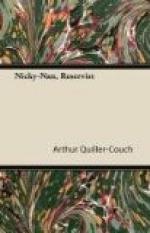rivulet” invariably writes of it as “the
River,” and by no other name does Polpier speak
of it to this day. On the lower or seaward side
of the bridge-end, where the channel measures some
three yards across, the flank of his house leaned
over the rushing water, to the sound of which he slept
at night. Across the stream the house of Mr Barrabell,
clerk, leaned forward at a more pronounced angle,
so that the two neighbours, had they been so minded,
might have shaken hands between their bedroom windows
before retiring to rest. Tradition reports this
Mr Barrabell (though an accountant for most of the
privateering companies in Polpier) to have been a
timorous man: and that once the Doctor, returning
home in the small hours from a midwifery case, found
his neighbour and his neighbour’s wife hiding
together under his bed-clothes. Upon an alarm
that Bonaparte was in the town, they had bridged the
stream with a ladder to the Doctor’s open window
and clambered across in their night-clothes.
It is reported also that, on the transit, Mrs Barrabell
was heard to say, “Go forward, Theophilus!
Th’ Old Doctor knows all about
me, if
he don’t about you. You can trust en to
the ends of the world.” “That’s
right enough, ma’am,” said the Doctor
in his great way; “but you appear to have gone
a bit further.” A variant of the story
has it that Mrs Barrabell was found beneath the bed,
and her spouse alone between the bed-clothes, into
which he had plunged with an exhortation, “Look
after yourself, darling!” “And what do
you think Theophilus found under that magnificent
man’s bed?” she asked her neighbours next
day. “Why, naught but a plumed hat in a
japanned case; no trace of alarm, and yet ready there
against any emergency.”
The Doctor (I should say) had held a commission—worn
a Major’s uniform—in the local Artillery
Volunteers during those days of the Napoleonic peril.
They passed, and he survived to die in times of peace,
leaving (as has been told) a local history for his
memorial. A tablet to his memory records that
“In all his life he never had a lawsuit.
Reader, take example and strive to be so good a man.”
In his childhood Nicky-Nan had listened to many a
legend of the Old Doctor, whose memory haunted every
street and by-lane and even attained to something
like apotheosis in the talk of the older inhabitants.
They told what an eye he had, as a naturalist, for
anything uncommon in the maunds; how he taught them
to be observant, alert for any strange fish, and to
bring it home alive, if possible; and how he was never
so happy as when seated on a bollard near the Quay-head
with a drawing-board on his knee, busy—for
he was a wonder with pencil and brush—transferring
to paper the outline and markings of a specimen and
its perishable exquisite colours; working rapidly
while he listened to the account of its capture, and
maybe pausing now and again to pencil a note on the
margin of the portrait. They told, too, of his




